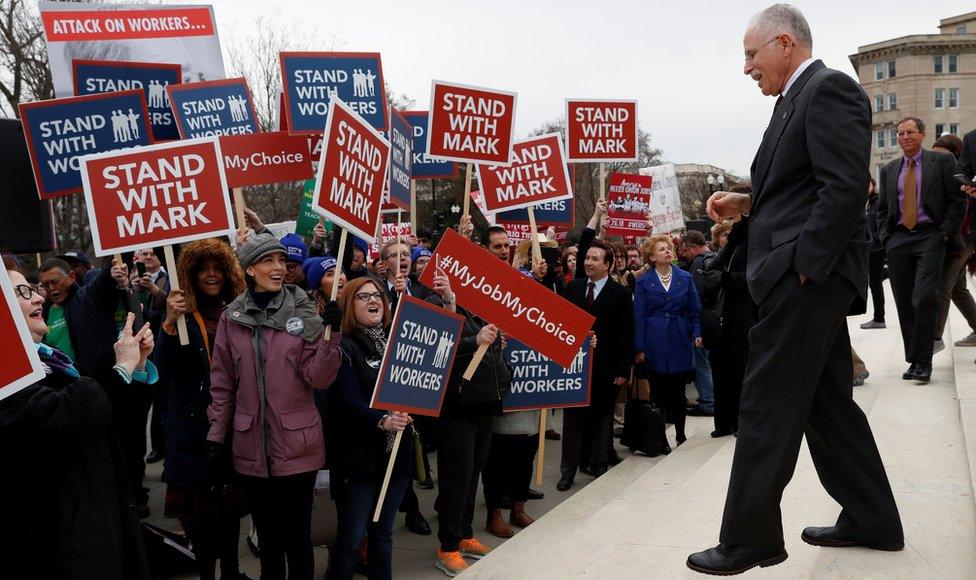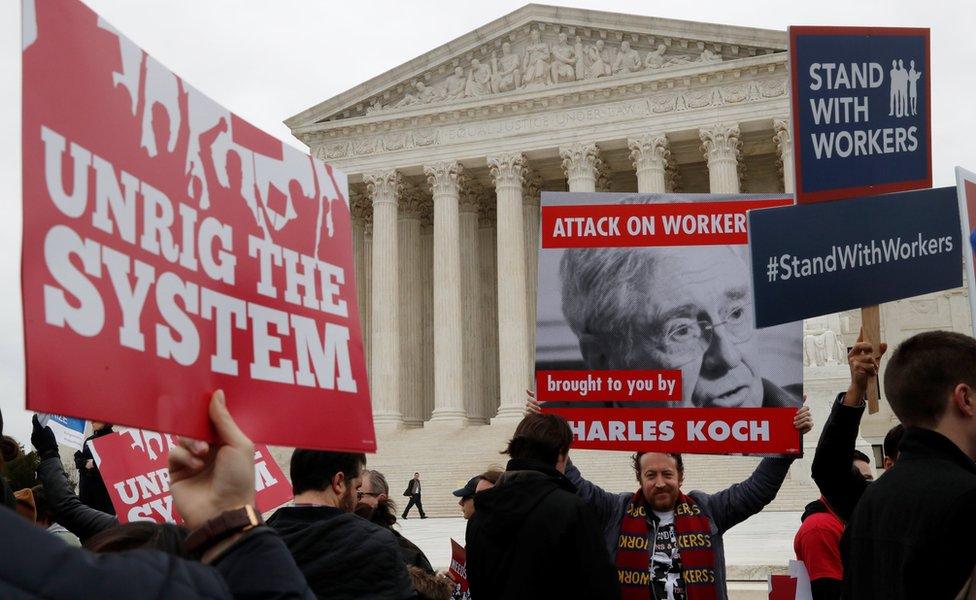Supreme Court unions case: Three reasons why it matters
- Published

Mark Janus stands before his supporters outside the Supreme Court on Monday
It's been called one of the most important US Supreme Court case on labour issues so far this century.
The court has met to essentially consider whether to cut off a funding stream to some of the most powerful trade unions in the US.
Their decision will have ramifications for up to five million people - here are three reasons why it matters.
1) It could deal a body blow to trade unions
The case being brought before the Supreme Court focuses on the rights of public sector workers, including teachers, police and firefighters.
Twenty-eight US states have rules that mean that workers in unionised workplaces are not legally bound to join unions as a condition of their employment. Workers there still get the same benefits as unionised workers.
That's not the case with the 20 states and the District of Columbia that went before the Supreme Court on Monday - workers there must either join the union or pay union fees.
The plaintiff in this case is Mark Janus, a child-support specialist in one of those states, Illinois. He chose not to join the union where he works, and says he could lose his job for doing so.
If he wins - as looks possible - it would mean that unions could lose a major source of funding across the country when union fees do not become mandatory.
When Wisconsin changed its rules to make fees or union membership non-mandatory, the percentage of public-sector employees who were union members dropped, external from 50% in 2011 to 26.1% in 2015.
So if the Supreme Court rules in Mark Janus' favour, it would mean that unions have less bargaining power, and less money to fight their causes.
Unions in New York state think they could lose up to $110m (£79m) a year without mandatory fees from non-members, according to the Empire Center for Public Policy.
"You're basically arguing, do away with unions," Sonia Sotomayor, one of the court's liberal justices, told a lawyer representing Mr Janus on Monday.
2) It could have a major impact on the Democratic Party

Union members have criticised wealthy backers of the legal moves
Cutting off a major revenue stream for public sector unions does the same to Democrats, and wealthy Republican donors have been bankrolling the case now before the Supreme Court.
In 2016, public sector unions contributed $15.7m to Democrats, external, compared to $1.7m to Republicans, and one public sector union, the National Education Association, gave 90% of its $2.9m political donation in 2016 to Democrats.
Even larger sums went to outside interest groups and political action committees (PACs).
On top of this, many of the states before the Supreme Court on Monday are ones with a strong Democratic base, including New York and Massachusetts.
It's not the first time this issue has come before the nine-member Supreme Court, but after the death of conservative justice Antonin Scalia in 2016, the court was tied 4-4.
Since then, Donald Trump has appointed another conservative, Neil Gorsuch, to the court. His presence means the court is likely to back Mark Janus' case by five votes to four, but he did not comment on Monday morning.
3) It's an important First Amendment debate
In the middle of the debate about the implications for unions, it's important to note what it could mean for the freedom of expression.
Those are the grounds for this case being brought before the court: Mr Janus says that his being forced to pay fees to unions whose views he may not share violates his right to free speech and free association.
As it is, he says he is not a member of a political party and that his objection is not based on politics.
Unions, for their part, say they are being subject to an attack on organised labour funded by powerful individuals.
"This case is about power," American Federation of Teachers President Randi Weingarten said.
The Supreme Court is expected to issue a ruling by June.